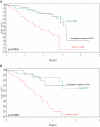Warfarin use associates with increased risk for stroke in hemodialysis patients with atrial fibrillation
- PMID: 19713308
- PMCID: PMC2754104
- DOI: 10.1681/ASN.2009030319
Warfarin use associates with increased risk for stroke in hemodialysis patients with atrial fibrillation
Abstract
Use of warfarin, clopidogrel, or aspirin associates with mortality among patients with ESRD, but the risk-benefit ratio may depend on underlying comorbidities. Here, we investigated the association between these medications and new stroke, mortality, and hospitalization in a retrospective cohort analysis of 1671 incident hemodialysis patients with preexisting atrial fibrillation. We followed patient outcomes from the time of initiation of dialysis for an average of 1.6 yr. Compared with nonuse, warfarin use associated with a significantly increased risk for new stroke (hazard ratio 1.93; 95% confidence interval 1.29 to 2.90); clopidogrel or aspirin use did not associate with increased risk for new stroke. Analysis using international normalized ratio (INR) suggested a dose-response relationship between the degree of anticoagulation and new stroke in patients on warfarin (P = 0.02 for trend). Warfarin users who received no INR monitoring in the first 90 d of dialysis had the highest risk for stroke compared with nonusers (hazard ratio 2.79; 95% confidence interval 1.65 to 4.70). Warfarin use did not associate with statistically significant increases in all-cause mortality or hospitalization. In conclusion, warfarin use among patients with both ESRD and atrial fibrillation associates with an increased risk for stroke. The risk is greatest in warfarin users who do not receive in-facility INR monitoring.
Figures



Comment in
-
Warfarin and stroke outcomes in hemodialysis patients with atrial fibrillation.J Am Soc Nephrol. 2009 Oct;20(10):2090-2. doi: 10.1681/ASN.2009070754. Epub 2009 Aug 27. J Am Soc Nephrol. 2009. PMID: 19713302 No abstract available.
References
-
- US Renal Data System: Cardiovascular Special Studies, Bethesda, National Institutes of Health, National Institute of Diabetes and Digestive and Kidney Diseases, 2005
-
- Reinecke H, Brand E, Mesters R, Schabitz WR, Fisher M, Pavenstadt H, Breithardt G: Dilemmas in the management of atrial fibrillation in chronic kidney disease. J Am Soc Nephrol 20: 705–711, 2009 - PubMed
-
- Fuster V, Ryden LE, Cannom DS, Crijns HJ, Curtis AB, Ellenbogen KA, Halperin JL, Le Heuzey JY, Kay GN, Lowe JE, Olsson SB, Prystowsky EN, Tamargo JL, Wann S, Smith SC, Jr, Jacobs AK, Adams CD, Anderson JL, Antman EM, Halperin JL, Hunt SA, Nishimura R, Ornato JP, Page RL, Riegel B, Priori SG, Blanc JJ, Budaj A, Camm AJ, Dean V, Deckers JW, Despres C, Dickstein K, Lekakis J, McGregor K, Metra M, Morais J, Osterspey A, Tamargo JL, Zamorano JL: ACC/AHA/ESC 2006 guidelines for the management of patients with atrial fibrillation: A report of the American College of Cardiology/American Heart Association Task Force on Practice Guidelines and the European Society of Cardiology Committee for Practice Guidelines (Writing Committee to Revise the 2001 Guidelines for the Management of Patients With Atrial Fibrillation). Developed in collaboration with the European Heart Rhythm Association and the Heart Rhythm Society. Circulation 114: e257–e354, 2006 - PubMed
-
- Singer DE, Albers GW, Dalen JE, Go AS, Halperin JL, Manning WJ: Antithrombotic therapy in atrial fibrillation: The Seventh ACCP Conference on Antithrombotic and Thrombolytic Therapy. Chest 126: 429S–456S, 2004 - PubMed
MeSH terms
Substances
LinkOut - more resources
Full Text Sources
Other Literature Sources
Medical

